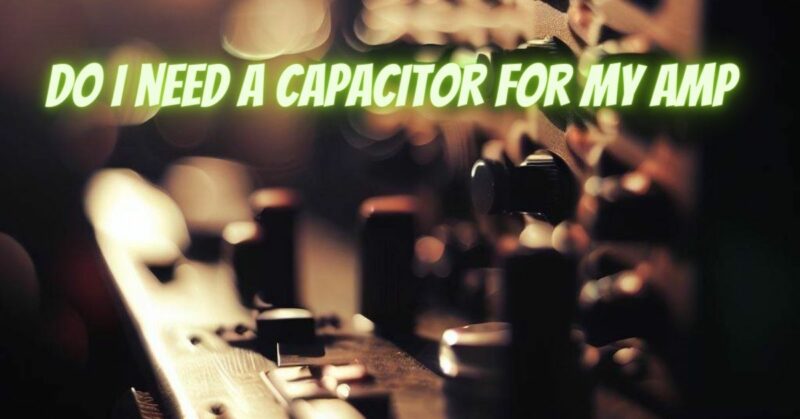When exploring the world of guitar amplifiers and their components, the term “capacitor” often comes up. Capacitors are electronic components that store and release electrical energy, and they serve essential functions in amplifiers. But do you need a capacitor for your amp? The answer depends on the type of amp you have, its design, and your specific requirements. In this article, we will explore the role of capacitors in guitar amps, the different types of capacitors used, and whether you need one for your amp.
The Role of Capacitors in Guitar Amps:
Capacitors play several crucial roles in the operation and tone shaping of guitar amplifiers:
- Power Filtering: Capacitors are used in the power supply section of the amplifier to filter the direct current (DC) voltage from the rectifier. They smooth out the power supply, removing unwanted noise and fluctuations, which ensures stable and clean power for the amplifier’s components.
- Tone Shaping: Capacitors are essential components in the tone control circuits, such as the tone knobs and tone stacks. Different capacitor values affect the bass, midrange, and treble frequencies, allowing players to shape their tone and customize the amplifier’s sound to their preference.
- Coupling: Capacitors are used in the signal path to couple different amplifier stages together. They allow the flow of AC (audio) signals while blocking the flow of DC signals. This coupling ensures that the amplifier functions correctly and doesn’t distort the audio signal.
Types of Capacitors Used in Amps:
Guitar amps use different types of capacitors, each with its characteristics and applications:
- Electrolytic Capacitors: These are the most common type of capacitors used in amplifiers for power filtering. They are relatively large in size and have high capacitance values, making them suitable for handling higher voltage and current levels.
- Polyester Film Capacitors: Polyester film capacitors are commonly used in tone control circuits. They offer excellent stability and are available in a wide range of capacitance values.
- Ceramic Capacitors: Ceramic capacitors are small, inexpensive, and suitable for coupling signals between amplifier stages.
Do You Need a Capacitor for Your Amp?
Whether you need a capacitor for your amp depends on the design and purpose of your amplifier. Most modern guitar amplifiers come equipped with all the necessary capacitors for proper operation and tone shaping. Manufacturers carefully select and design the capacitors to ensure the amplifier performs optimally and delivers the intended tone.
If you’re building a custom amp or modifying an existing one, you may need to consider capacitors to tailor the sound to your liking. In such cases, it’s essential to have a good understanding of how capacitors impact the tone and to choose the appropriate values for your specific preferences.
Capacitors are essential components in guitar amplifiers, serving critical functions in power filtering, tone shaping, and signal coupling. For most guitarists, the capacitors in their amp are already in place and optimized by the manufacturer to deliver the intended sound. If you’re using a commercially available amplifier, you likely don’t need to worry about adding or changing capacitors. However, if you’re customizing or building your own amp, capacitors become a valuable tool to fine-tune your tone. Always consider seeking the advice of an experienced technician or luthier if you’re unsure about modifying your amp’s components. Ultimately, the capacitors in your amp play a vital role in shaping your sound and providing you with an enjoyable playing experience.


